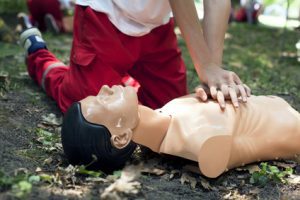CPR Training

Sudden cardiac arrest (SCA) can happen at any time, to anyone, without warning; therefore it is extremely important to educate yourself and the people around you about how to administer CPR and how to handle possible emergency situations. It is crucial to bring awareness to CPR certification courses and its rising importance today.
The knowledge of how to perform CPR, whether you are at work or at home may mean the difference between life or death for you, your loved ones, your coworkers and all the people around you. Additionally, possessing the knowledge of how to perform CPR and use an AED can allow you to maintain your composure and make wiser decisions during an emergency situation.
If you are interested in taking a CPR/AED/FA class please call us at 228-697-3199. We offer:
- CPR & AED
- Basic First Aid Certification
- OSHA 10 & 30
- Bloodborne Pathogens Training
- and much more!
Why is CPR education in the workplace so important? Because it can prevent costly injuries and deadly situations. Unintentional injuries are the leading cause of death in the US for individuals younger than 44 years of age. On average, 15 workers die each day in the US from traumatic injuries, and more than 4 million workers suffer a nonfatal injury or illness each year.
Safe practices at work can prevent many injuries, illnesses, and deaths. However, one injury or sudden illness occurrences, effective First Aid can make the difference between a rapid or prolonged recovery, a temporary or permanent disability, and even life or death.
CPR Statistics
- OSHA defines first aid as “emergency care provided for injury or sudden illness before professional emergency treatment becomes available.”
- Sudden cardiac arrest is most often caused by an abnormal heart rhythm that is quivering in an abnormal fashion called ventricular fibrillation (VF). Cardiac arrest can also occur after the initial onset of a heart attack or as a result of an electrocution or near-drowning.
- About 80% of all out-of-hospital cardiac arrests occur in private residential settings (our homes). Being trained to perform cardiopulmonary resuscitation (CPR) can mean the difference between life and death for a loved one.
- Effective bystander CPR, provided immediately after cardiac arrest, can double a victim’s chance for survival.
- CPR helps maintain vital blood and oxygen to the heart and brain and increases the amount of time that an electric shock from an AED (automated external defibrillator) can be effective.
- Approximately 95% of cardiac arrest victims die before reaching the hospital.
- Death from cardiac arrest is not necessarily inevitable. If more people were trained in CPR/AEDs, more lives could be saved.
- Brain death starts to occur in four to six minutes after a person experiences cardiac arrest if no CPR and defibrillation occurs during that time.
- If bystander CPR is not provided, a cardiac arrest victim’s chances of survival fall 10% for every minute of delay until defibrillation.